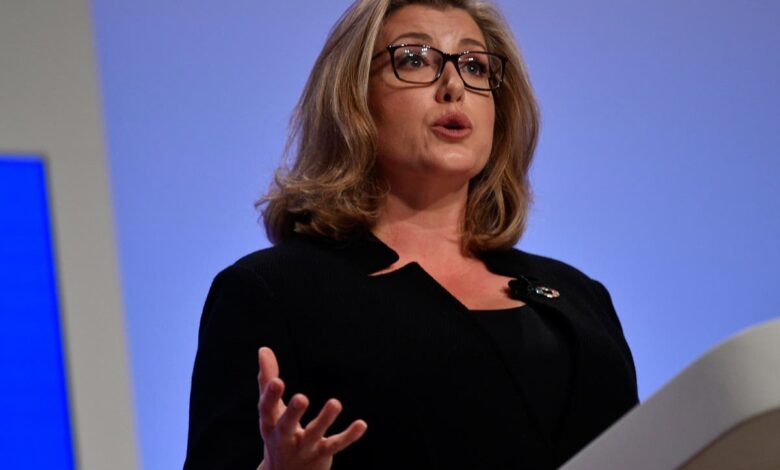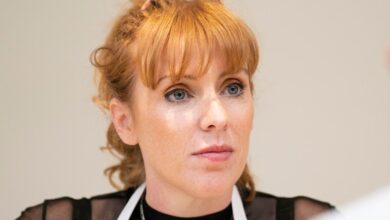Penny Mordaunt: The navy reservist sailing ahead in the Tory leadership contest

It may come as something of a surprise, but the favourite to become the next leader of the Conservative Party, with almost twice as many votes in YouGov’s latest poll as second-placed Kemi Badenoch, is Penny Mordaunt.
She’s well ahead of Rishi Sunak, Liz Truss and Tom Tugendhat and enjoys a more substantial lead over such senior figures as Jeremy Hunt and Nadhim Zahawi.
Bookies say she is a 5/6 shot, admittedly in a crowded and slightly volatile field. The gossips, analysts and commentators of the Westminster bubble concur, and her status as a future leader has been established for some time – almost since she arrived in the Commons in 2010, having won the seat of Portsmouth North from Labour on an impressive swing.
But what exactly is it that attracts the predominantly heterosexual and male parliamentary Conservative Party to the Right Honourable Penelope Mary Mordaunt?
Such a question has to be posed because she is the first future prime minister to have appeared in a swimsuit on national television, back in 2014, on the otherwise forgettable ITV celebrity diving show Splash!, which also featured the likes of Joey Essex, Linda Barker and Eddie “the Eagle” Edwards.
Sad to say, Mordaunt’s backflip was a bit of a flop. Jo Brand, an unlikely judge, and Tom Daley sent her back to the changing rooms, but she made off with £10,000 in prize money, some of which she used to rebuild a lido in her constituency, the rest being distributed among military charities. (This is in sharp contrast to the time Nadine Dorries earned £20,288 from her turn on I’m a Celebrity… Get Me Out of Here!, which she failed to declare in the register of members’ interests.)
Apart from being game for a game show, Mordaunt has much else to commend her. She’s a Leaver and she comes from a military family, both attributes that well suit the performatively nationalistic Tory party of today. Indeed, this ocean-going leadership contender was named after HMS Penelope.
Her father served in the Royal Marines before going into teaching and Mordaunt was brought up in Portsmouth (as a nine-year-old schoolgirl she soaked in all the city’s tense excitement during the Falklands conflict in 1982). She explained in her maiden speech some three decades later that HMS Penelope was “the first cruiser able to do a complete about-turn within her own length – a manoeuvre that I hope never to have to deploy here”.
Her mother died of cancer when Mordaunt was 1 and she became a carer to her younger brother, but it didn’t affect her education at a comprehensive Roman Catholic state school. Despite a vaguely posh-sounding name, her family background isn’t especially prosperous and she worked as a magician’s assistant to fund her way through her A-levels. After university she went into PR, with spells working for the party’s youth wing, for William Hague and for George W Bush’s presidential campaigns in 2000 and 2004 (as head of foreign press).
If Mordaunt ever does make it into No 10, following two Etonians and a grammar-school girl, she will actually be the first prime minister to have attended a comprehensive. She also obtained a degree in philosophy, from the University of Reading. Mordaunt is a proud Royal Navy reservist, lately promoted to captain, which would mean she could be addressed in the Commons as the “right honourable and gallant lady”, which seems to suit her. During her brief spell as secretary of state for defence, she was, in effect, her own commander.
She certainly ticks the patriotic box, although she is not the only ex-military type jostling for position – Tom Tugendhat served in the Territorial Army and Intelligence Corps. It suggests a perfectly understandable reaction against the chaotic, undisciplined ways of Boris Johnson and Mordaunt is as much an antidote to the rule-breaking albino greased piglet as is any of her rivals.
She’s keen on talking about how important practical planning is to ministerial success (as opposed to grandiose Johnsonian schemes) and how she wants to see a series of “national missions” to unite the nation. As a social liberal, she also seems less willing to stir up culture wars. Indeed, she got herself into some controversy last year by standing up for the human rights of trans people, saying that “trans men are men and trans women are women”. That took as much guts as her televised high-diving, and she’s not the type to duck a challenge, or to dither and delay, Johnson-style.
That she has a very different personality from that of the prime minister might also explain why he sacked her so abruptly as defence secretary when he became prime minister in 2019 – reportedly in a “brief conversation” – along with the tepid nature of her support for the prime minister in recent days. On the day of the confidence vote in June, it was noted that Mordaunt had tweeted out a constituency engagement commemorating the D-Day landings and the value of selfless service, rather than the copy-and-paste toadying tweet chosen by most of her colleagues.
When she eventually put out a statement, it was more damaging to the prime minister than if she’d kept shtum, with its pointedly past tense: “I didn’t choose this prime minister, I didn’t support him in the leadership contest, but he has always had my loyalty, because I think that’s what you do when you have a democratic process – you select a leader, and then you owe that person your loyalty. That’s always been my approach, whatever differences I’ve had with people, and that remains.
“I’m one of his ministers and I have continued to support him. I hope that we can return swiftly to the real business at hand, which is getting growth back into the economy and continuing our support in the Ukraine. I think being here, at the D-Day memorial in Portsmouth today, is a reminder of what’s really important outside the Westminster bubble.”
She risked, if that’s the right word, being sacked by Johnson a second time; but he’s so weak he couldn’t dump her, because it was a secret ballot, and all he would have succeeded in doing is anointing her as a brave challenger to his own malfeasance. Such a drama would also have invited unwelcome comparisons with his own cowardice: she’d have been the absolute darling of the rebels. Mordaunt still hasn’t said how she voted. She hardly needs to.
We do know that she supported Hunt the last time the Tories had a leadership election, even introducing him at his launch event and this pair share a certain style of politics – a bit technocratic, managerial, and with a liking for sub-business-school jargon and theorising about “leadership”. She wrote a book titled Greater: Britain After the Storm, which is full of the kind of charts and schematics you’d expect to see peppering an MBA thesis and it reads like an amateurish version of the rather more mystifying stuff you encounter on Dominic Cummings’s blog.
Writing for Conservative Home in 2018, she declared on behalf of her party: “We are peddlers of hope” and she once said she thought Brexit Britain was “a challenger brand”, perhaps like Dacia cars, Monzo cards or Aldi, which gives you a taste of the Armando Iannucci-grade self-parody into which she can sometimes lapse.
It’s worth noting that one reviewer detected a more disturbing undertone in her writing: “Despite the book’s chipper optimism, a deeper cultural conflict simmers below the surface. When Mordaunt extols the success of Donald Trump’s electoral appeal to middle America, hints at crafting a version of his agenda for the United Kingdom, and speaks of ‘empowering the silent majority’, she offers a glimpse of an ominous possible future for the Conservative Party.”





